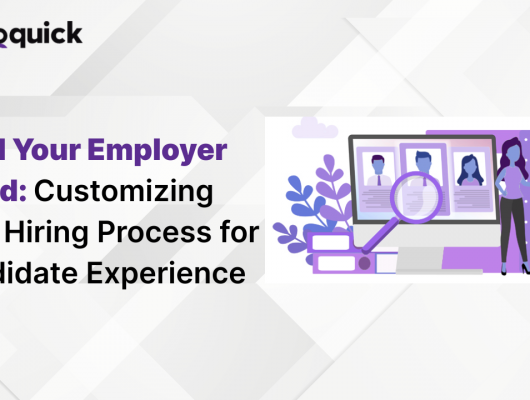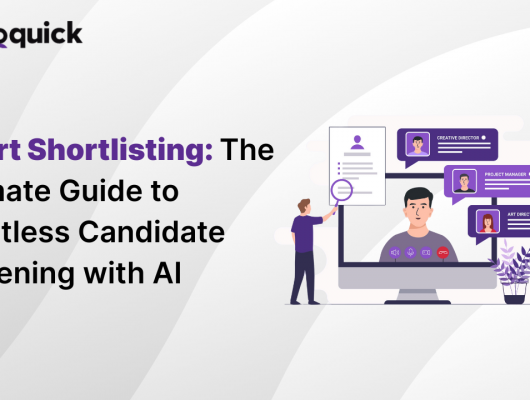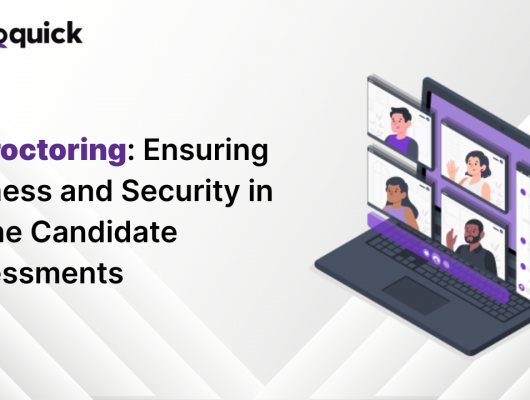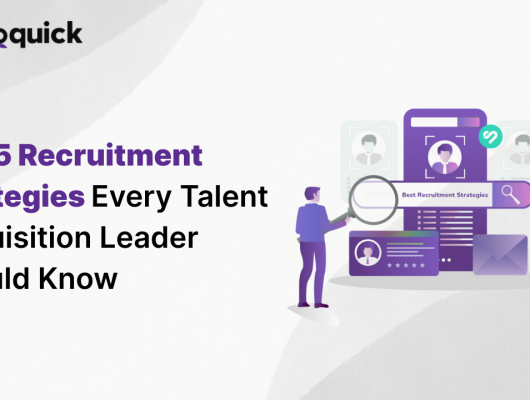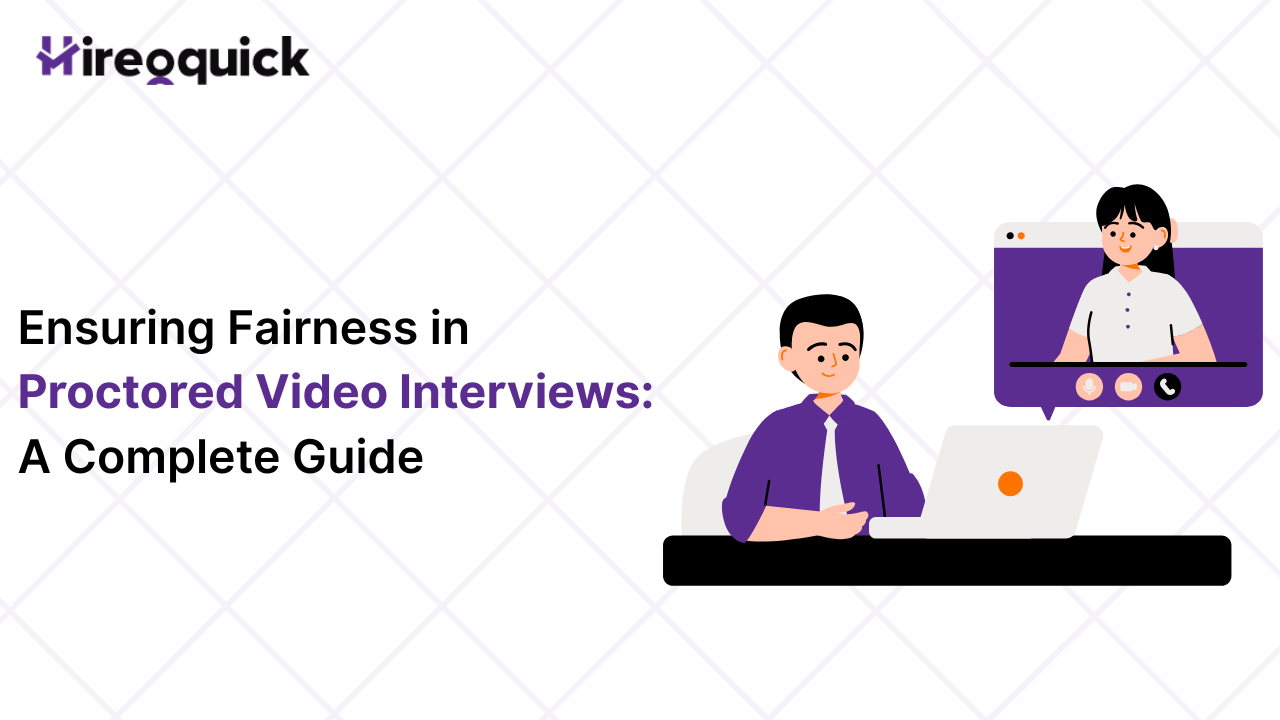
Recruitment processes are evolving rapidly, and many businesses have shifted to video interviews as part of their hiring strategy. While traditional in-person interviews offer an opportunity for face-to-face interaction, video interviews provide convenience, flexibility, and access to a broader talent pool. However, with the increasing reliance on video interviews, there’s a growing need for ensuring fairness in the process. Proctored video interviews have emerged as an essential tool to ensure a secure and unbiased interview environment. These interviews are monitored by AI-powered tools to prevent cheating, ensure transparency, and uphold the integrity of the hiring process. But how can businesses ensure that these proctored video interviews are fair and free from bias? This guide explores how to ensure fairness in proctored video interviews, offering a step-by-step approach to implementing best practices.
Why Fairness in Proctored Video Interviews Matters
In a competitive job market, it’s essential to ensure that your recruitment process is as fair and unbiased as possible. Traditional interview formats often come with inherent biases, whether conscious or unconscious, such as favoring candidates based on appearance, body language, or subjective impressions. Video interviews aim to reduce such biases by allowing hiring managers to focus on the candidate’s skills and experience.
However, even video interviews can present challenges when it comes to fairness. Without the right tools in place, candidates may be at risk of unfair treatment due to distractions, technology issues, or even unintentional bias during the interview process. Proctored video interviews are designed to mitigate these issues and provide a level playing field for all candidates, ensuring that every candidate has an equal opportunity to succeed(source).
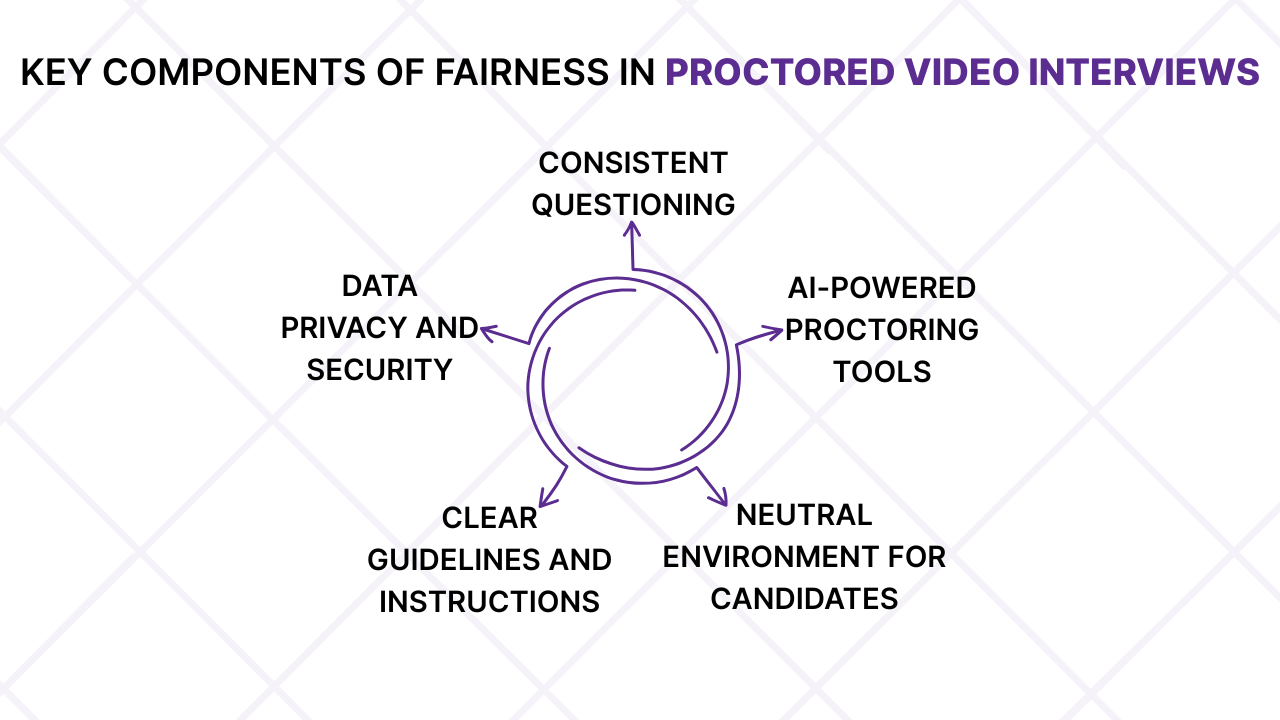
Key Components of Fairness in Proctored Video Interviews
To ensure that your proctored video interviews are fair, several key components need to be addressed. These elements help create a transparent, unbiased, and secure interview process.
Clear Guidelines and Instructions
Candidates should be provided with clear instructions about the interview process, including how the proctoring will work. Transparency is key when it comes to creating a fair environment. Clearly explain the following to candidates:
- The purpose of proctoring (ensuring fair assessments and preventing cheating).
- What to expect during the interview, including any monitoring tools used.
- How long the interview will take and what resources (like a stable internet connection or camera) are needed.
Clear communication and transparency set the tone for fairness and help reduce any anxiety or confusion candidates may have about the proctored process.
AI-Powered Proctoring Tools
AI-powered proctoring tools play a vital role in ensuring fairness during the interview. These tools monitor candidates’ behaviors to prevent cheating, such as looking away from the screen, using external resources, or having unauthorized individuals in the room. By leveraging AI and automation, these tools can detect potential cheating without human bias.
For example, AI can monitor facial expressions and detect if a candidate is distracted or reading from notes. This ensures that candidates are genuinely answering questions based on their knowledge, skills, and abilities, rather than relying on external help.
Consistent Questioning
One of the biggest advantages of proctored video interviews is the ability to standardize questions across all candidates. To ensure fairness, all candidates should be asked the same set of questions in the same order. This eliminates bias that may arise from interviewers unintentionally asking leading or different questions based on the candidate’s background or appearance.
Furthermore, automated platforms like HireOquick allow recruiters to create tailored question sets and assessments, ensuring consistency throughout the interview process. This standardization is essential for ensuring that every candidate is evaluated on the same criteria, leading to fairer and more objective decisions.
Neutral Environment for Candidates
Creating a neutral environment during the interview process is another essential aspect of fairness. Ensure that candidates are interviewed in a quiet, controlled setting where distractions are minimized. If possible, provide a virtual background for the interview to help eliminate any bias associated with the candidate’s environment or background.
In addition, ensure that there is no preference shown towards certain candidates based on their appearance, accent, or other non-relevant factors. AI-driven proctoring tools can also be used to monitor the environment to ensure that no outside factors influence the interview.
Data Privacy and Security
Fairness also involves protecting candidates’ personal data. Ensure that any information gathered during the interview process, such as video recordings and answers to questions, is stored securely. Implement data privacy measures to ensure that only authorized personnel can access the data, and candidates should be informed of how their data will be used and stored.
HireOquick ensures compliance with data protection laws, giving both candidates and employers peace of mind. With secure data storage and encrypted communications, you can guarantee a safe and private interview experience.
Best Practices for Conducting Fair Proctored Video Interviews
To implement fairness in your proctored video interview process, it’s important to follow a set of best practices that will ensure your hiring process is transparent, efficient, and free from bias. Below are several actionable strategies to enhance fairness in your recruitment process:
Automate Candidate Evaluation with AI
Using AI to automate candidate evaluation can help eliminate human bias. AI can analyze answers based on predefined criteria, such as knowledge, skills, and abilities, ensuring that each candidate is assessed objectively. This also allows recruiters to evaluate a large pool of candidates more quickly and accurately.
Platforms like HireOquick offer automated assessment tools that can grade candidates on various competencies based on predefined rubrics, ensuring fairness and consistency across all candidates.
Offer Accommodations for Candidates with Special Needs
Ensure that your proctored video interview process is inclusive by offering accommodations for candidates with special needs. This could include providing additional time, alternative question formats, or technical assistance during the interview. Proctored video interview platforms should allow customization of interview settings to support candidates who may require these adjustments.
Ensure a Balanced Panel of Interviewers
When possible, involve multiple interviewers in the assessment process. This helps minimize individual biases and ensures that no one person has too much influence over the hiring decision. A diverse panel can offer a more balanced and fair evaluation of candidates.
Regularly Review and Improve Your Interview Process
Continuously assess your proctored video interview process for fairness. Collect feedback from candidates and interviewers, and use data-driven insights to refine the process over time. Regularly updating your proctoring software, training interviewers, and ensuring the fairness of your evaluations will contribute to a more equitable hiring experience.
How HireOquick Enhances Fairness in Proctored Video Interviews
HireOquick is a comprehensive AI-powered recruitment platform designed to streamline the hiring process while ensuring fairness throughout. With its integrated proctored video interview tools, HireOquick allows companies to monitor candidate behavior during interviews and ensure that the process is secure, consistent, and free from bias.
Key features of HireOquick include:
- AI-Powered Candidate Evaluation: Automatically assess candidates based on predefined criteria to ensure objective evaluation.
- Customizable Proctored Interviews: Tailor the proctoring settings to suit your hiring needs, from monitoring candidates’ behaviors to providing special accommodations.
- Secure and Compliant Data Management: Protect candidate data with secure, encrypted storage to ensure privacy and data protection.
- Consistent Interview Questioning: Standardize questions and assessments to ensure fairness across all candidates.
By using HireOquick, businesses can ensure that their proctored video interviews are as fair and transparent as possible, resulting in better hiring decisions and a more diverse workforce.
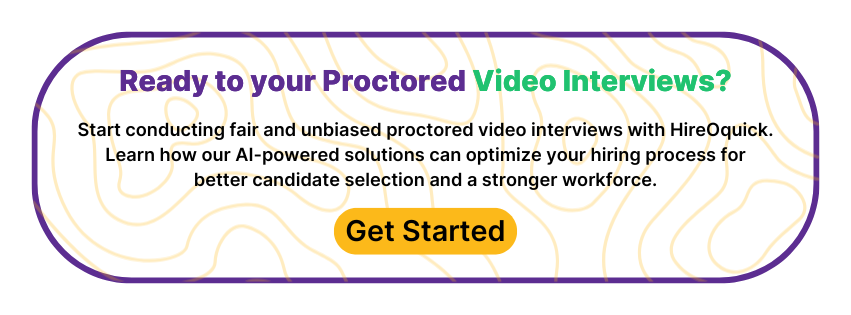
Conclusion
Ensuring fairness in proctored video interviews is critical for creating an unbiased and transparent recruitment process. By leveraging AI-powered tools, offering clear instructions, and maintaining a neutral environment, businesses can provide all candidates with an equal opportunity to showcase their abilities. Proctored video interviews, when done right, can significantly improve the quality and fairness of the hiring process, helping businesses select the best candidates while building a strong employer brand.
Ready to enhance fairness in your recruitment process? Explore HireOquick today to streamline your proctored video interviews and ensure the most objective, secure, and unbiased hiring decisions.

